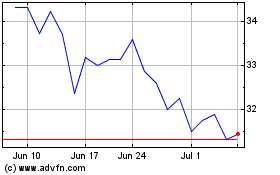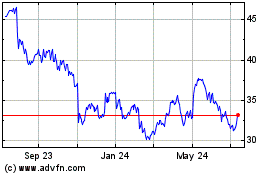By Jeff Bennett
Auto-parts makers with big exposure to the diesel-car market are
racing to salvage the technology's reputation in the wake of the
Volkswagen AG emissions-cheating scandal.
Shares of the parts makers, which include Tenneco Inc.,
BorgWarner Inc., Delphi Automotive PLC and Continental AG, were
pummeled last week following the Environmental Protection Agency's
disclosure that VW cheated for years on emissions tests of its
diesel-powered cars.
The parts industry's focus has shifted to defending the
viability of diesel technology amid concerns that betrayed
consumers or auto makers, which face tighter government scrutiny of
diesel, will turn their attention to hybrids and electric-powered
vehicles.
"You can't have an event like this without questions being
raised, but that doesn't mean the technology doesn't work," said
Terrence Hahn, chief executive of Honeywell International Inc.'s
$3.8 billion Transportation Systems unit.
"We have seen proven results around clean-diesel technology, and
we don't want what one auto maker has done to tarnish the industry
or the technology," Mr. Hahn said.
Wall Street wasn't convinced, however. Shares of Honeywell, a
major supplier of the turbochargers often used to make
diesel-powered cars peppier, fell 10 cents Friday to $93.52, down
about 5% from their close on Sept. 18. That was the day the EPA
accused VW of installing illegal software that sharply reduces
nitrogen-oxide emissions, but only when the cars are undergoing
strict emission tests.
VW later acknowledged its use of the software and issued an
apology.
The company promised to find a remedy to repair the 482,000 VW
diesel cars in the U.S. as soon as possible. On Sunday, it launched
the website vwdieselinfo.com to tell VW diesel owners about the
company's plans to fix their vehicles.
Shares of Tenneco, which makes emissions systems and gets 8% of
its revenue from VW, sank almost 8% last week, while those of
BorgWarner, which generates 17% of its revenue from the auto maker,
fell 6%, finishing the week at $40.
BorgWarner recently opened plants in Portugal and South Korea,
partly to produce more components used in starting diesel
engines.
Continental, a German supplier of engine components, also was
under pressure. Its stock lost nearly 6% of its market value last
week.
Closely held Robert Bosch GmbH, the German giant that supplied
the components now at the center of the emissions probe, has said
VW was responsible for how the parts were installed.
On Friday, the EPA indicated it would step up scrutiny of diesel
vehicles by overhauling the way it oversees the industry's
compliance with emissions standards.
The regulator sent a letter to auto makers saying that it will
conduct tests of 2015 and 2016 vehicles under normal driving
conditions, rather than accepting lab results, as it has done in
the past.
In the U.S., diesel engines are largely confined to heavier
trucks, with diesel-powered cars representing just a small part of
the passenger-car market. But diesel is dominant in Europe,
accounting for more than 50% of the passenger-car market in 2015,
according to Barclays.
Before the scandal broke, J.D. Power & Associates expected
diesel to expand to 7% of the U.S. light-vehicle market by 2017
from 3% this year.
Barclays analyst Brian Johnson suggests those growth
expectations need to change, both in the U.S. and Europe. And that
will squeeze some parts makers.
"Whatever the specifics that emerge from a VW investigation, we
believe strongly that the VW scandal will heighten the pressure on
diesel in Europe," he said in a research note last week.
"The end result of the VW issues will be to accelerate a move
away from diesel in the European mass market, pressuring suppliers
leveraged to diesel," Mr. Johnson said.
Mike Jackson, chief executive of AutoNation Inc., the largest
U.S. auto retailer, said it would tough to rebuild trust with
potential diesel buyers in the U.S. "It is another black eye for
diesel engines overall," he said.
Mr. Johnson of Barclays added that auto makers might need to
accelerate development efforts of electric vehicles, hybrid and
more-efficient gasoline engines.
That could help parts makers, since many of the same companies
will have to supply those component. But their investments in
diesel-powered cars could be lost if the industry shifts to those
alternatives.
Write to Jeff Bennett at jeff.bennett@wsj.com
Access Investor Kit for "Continental AG"
Visit
http://www.companyspotlight.com/partner?cp_code=P479&isin=DE0005439004
Access Investor Kit for "Volkswagen AG"
Visit
http://www.companyspotlight.com/partner?cp_code=P479&isin=DE0007664039
Subscribe to WSJ: http://online.wsj.com?mod=djnwires
(END) Dow Jones Newswires
September 27, 2015 19:18 ET (23:18 GMT)
Copyright (c) 2015 Dow Jones & Company, Inc.
BorgWarner (NYSE:BWA)
Historical Stock Chart
From Mar 2024 to Apr 2024

BorgWarner (NYSE:BWA)
Historical Stock Chart
From Apr 2023 to Apr 2024
